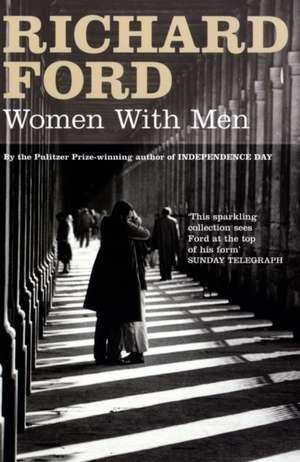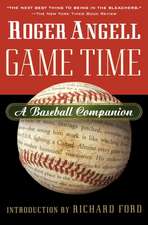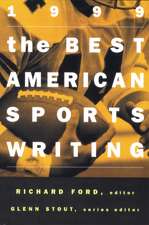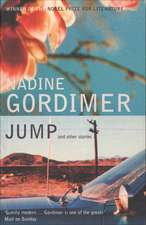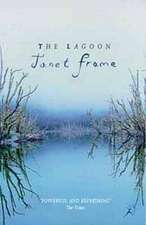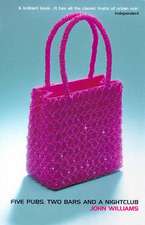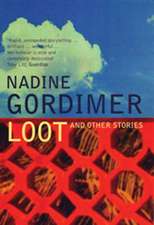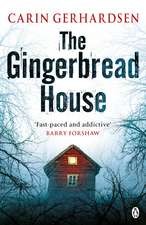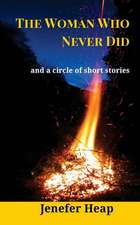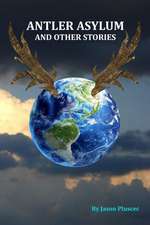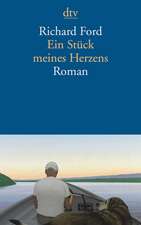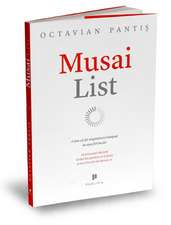Women With Men
Autor Richard Forden Limba Engleză Paperback – oct 2006
| Toate formatele și edițiile | Preț | Express |
|---|---|---|
| Paperback (2) | 70.36 lei 3-5 săpt. | |
| Bloomsbury Publishing – oct 2006 | 70.36 lei 3-5 săpt. | |
| Vintage Publishing – 31 mar 1998 | 106.23 lei 3-5 săpt. |
Preț: 70.36 lei
Preț vechi: 93.99 lei
-25% Nou
Puncte Express: 106
Preț estimativ în valută:
13.47€ • 14.01$ • 11.12£
13.47€ • 14.01$ • 11.12£
Carte disponibilă
Livrare economică 24 martie-07 aprilie
Preluare comenzi: 021 569.72.76
Specificații
ISBN-13: 9780747585275
ISBN-10: 074758527X
Pagini: 272
Dimensiuni: 129 x 198 x 19 mm
Greutate: 0.22 kg
Ediția:New ed
Editura: Bloomsbury Publishing
Colecția Bloomsbury Paperbacks
Locul publicării:London, United Kingdom
ISBN-10: 074758527X
Pagini: 272
Dimensiuni: 129 x 198 x 19 mm
Greutate: 0.22 kg
Ediția:New ed
Editura: Bloomsbury Publishing
Colecția Bloomsbury Paperbacks
Locul publicării:London, United Kingdom
Caracteristici
Published to coincide with Richard Ford's debut hardback for Bloomsbury, The Lay of the Land
Notă biografică
Richard Ford was born in Jackson, Mississippi, in 1944. He has published five novels and three collections of stories, including The Sportswriter, Independence Day, Wildlife, A Multitude of Sins and most recently The Lay of the Land. Independence Day was awarded the Pulitzer Prize and the PEN/Faulkner Award for Fiction.
Recenzii
'Superb ... Nobody now writing looks more like an American classic'
'Not only superb, it brings Ford to new territories ... Ford's is the voice of twentieth-century America: funny, human, sad and real. And these stories represent the best of that voice'
'Here are three perfect "long" stories, so sinuously entwined and so subtly echoing one another that the whole towers like a great novel'
'Freighted with inspired insight into the lies men tell themselves. Ford justifies the praise he received for Independence Day. There is no better observer of the modern male now writing'
'Not only superb, it brings Ford to new territories ... Ford's is the voice of twentieth-century America: funny, human, sad and real. And these stories represent the best of that voice'
'Here are three perfect "long" stories, so sinuously entwined and so subtly echoing one another that the whole towers like a great novel'
'Freighted with inspired insight into the lies men tell themselves. Ford justifies the praise he received for Independence Day. There is no better observer of the modern male now writing'
Descriere
A trio of masterful stories from the foremost American novelist
Extras
Jealous
In the last days that I lived with my father in his house below the Teton River, he read to me. Seated at the kitchen table after work or on the cold mornings when I dressed in front of him by the stove, he read out loud to me from the Havre or the Conrad newspapers or from magazines -- Lifes or Geographics -- or from old schoolbooks that had been bound in twine and abandoned in the back rooms by some previous, unknown family who'd left behind the things they couldn't take.
We were alone there. These were the months following my mother's first departure, and we had lived out from Dutton since my school year began. My mother had left the summer before, at the end of a long period of troubles between them, and almost immediately after that my father quit his job in Great Falls and moved us up to Dutton, where he took a new job, working on farm machinery. He had always liked a drink, and so had my mother, and they had had friends who drank. But in Dutton he quit drinking altogether, quit having any whiskey around the house. He worked long days in town, and trained his bird dogs in the evening, and I went to high school. And that was what life was like.
It may have been, of course, that he was expecting some important event to take place, some piece of new news to suddenly reach him. Possibly he was waiting, as the saying goes, for lightning to strike, and what he wanted was to be in the right place and in the right frame of mind to make a decision when it happened. And it may have been that he read to me as a way of saying, "We don't know all there is to know. There's more order in life than seems to be. We have to pay attention." That is all another way of saying that he was at a loss. Though my father had never been a man who stood by and watched things get the better of him. He was a man who acted, a man who cared to do the right thing. And I know that even on the day these events took place he was aware that a moment to act may have come. None of it is anything I blame him for.
On the day before Thanksgiving, it rained an hour before daylight, when I was waking up, then rained through the afternoon, when the temperature fell and snow began and the front of the mountains disappeared into a bluish fog, so that it was no longer possible to see the grain elevators in Dutton, ten miles away.
My father and I were waiting for my mother's sister to arrive to take me to the train in Shelby. I was going to Seattle to visit my mother, and my aunt was going with me. I was seventeen years old then. It was 1975, and I had never ridden on a train before.
My father had come home early, taken a bath, dressed in a clean shirt and slacks, then sat down at the kitchen table with a stack of Newsweeks from the town library. I was already dressed. My bag was packed, and I was standing at the kitchen window watching for my aunt's car.
"Are you familiar with Patrice Lumumba?" my father said after reading to himself for a while. He was a tall, bony-chested man with thick black hair and thick hands and arms, and the table seemed small in front of him.
"Was she a singer?" I said.
"He," my father said, looking out the lower lenses of his glasses as if he were trying to read small print. "He was the African Negro Eisenhower wanted to poison in 1960. Only Ike missed his big chance. His other enemies blew him up first. We all thought it was mysterious back then, of course, but I guess it wasn't that mysterious." He took his glasses off and rubbed them on his shirt cuff. One of the setters barked out in the pen. I watched it come to the fence by the corner of the granary, sniff through the wires, then walk back in the misting snow to its house, where its sister was in the doorway. "The Republicans always have secrets," my father said, holding his glasses up and looking through them. "A great deal goes on before you wake up to life."
"I guess so," I said.
"But you can't change it," he said, "so don't let it eat at you."
Through the window I saw my aunt's big pink Cadillac appear suddenly up on the horizon road, rushing ahead of its snow cloud, still a mile out.
"What're you going to tell your mother about living out here out-of-sight-of-land all this fall?" my father said. "That there's an atmosphere of mystery on the open prairie?" He looked up and smiled at me. "That I've been neglecting your education?"
"I hadn't thought about it very much yet," I said.
"Well, think about it. You'll have time on the train if your aunt will leave you alone." He looked back at the []Newsweek[] and laid his glasses on the table.
I had hoped to say something to my father before my aunt arrived, something about my mother, that I was happy I was going to get to see her. We had not talked about her very much.
"What do you think about Mother?" I said.
"With respect to what?"
"Do you think she'll come back out here after Thanksgiving?"
He drummed his fingers on the metal tabletop, then turned and looked at the clock on the stove. "Do you want to ask her about it?"
"No, sir," I said.
"Well. You can. Then you can tell me." He looked at the window as though he was checking the weather. One of the dogs barked again, and then the other one barked. Sometimes a coyote came into the yard out of the wheat fields and set them off. "Eventually the suspense falls out of the story," he said. He closed the magazine and folded his hands on top of it. "Who's your best friend now? Im just curious."
"Just my ones in the Falls, still," I said.
"Who's your best one in Dutton?"
"I don't have one now," I said.
My father put his glasses back on. "That's too bad. It's your choice, of course."
"I know it," I said, because I had already considered that and decided I didn't have time to get to know anybody there.
I watched my aunt's car turn onto our road and the pale beams of her headlights burn through the snowy air.
A mile farther down the road, a blue mobile home sat out in the fields, unprotected from the wind. The farmer in town who owned our house owned it, too, and rented it to the civics teacher at the high school. Joyce Jensen was her name. She was in her twenties, and was a heavyset woman with strawberry-colored hair, and my father had slept some nights down there in the last month. "Yoyce Yensen," he called her, and always laughed. I could see a new car parked in front of her trailer, a red one beside her dark one.
"What do you see out there?" my father said. "Have you caught sight of your aunt Doris?"
"She's got her lights on," I said.
"Well," my father said, "then you're gone, you just haven't left yet." He reached in his shirt pocket and took out a little fold of bills with a rubber band around it. "When you get to Shelby, buy your mother a bijou, he said. She won't expect it. It'll make her happy." He handed the money up to me, then stood to watch my aunt drive to the house. "There's a moment in the day when you miss having a drink," he said. He put his hand on my shoulder, and I could smell soap on his skin. "That's the old life. We're on to the new life now. The lucky few."
My aunt honked her horn as she came past the caragana row into the house lot. She drove an Eldorado Cadillac, a '69, faded pink with a white vinyl top. Her wipers were on, and the windows were fogged. She had parked that car in front of our house in Great Falls, and I had given it a good inspection then.
"Let me step out and tell your aunt Doris a joke," my father said. "You go lock the shutters on the pigeons. I'll forget about them tonight, and snow'll get in. I won't be but a minute." My aunt's window came down as my father started to the door. I could see her looking at our little farmhouse as if she thought it was abandoned.
My aunt Doris was a pretty woman and had a reputation for being wild, which my mother didn't have, or so my father had told me. She was my mother's younger sister, and was thirty-six and blond and thin, with soft, pale arms you could see her veins in. She wore glasses, and the one time I had seen her without them, a morning when I woke up and she was in the house, she looked like a girl to me, somebody younger than I was. I knew that my father liked her, and that they'd had something between them in Great Falls after my mother left, even though Doris was married to a Gros Ventre Indian man, who wasn't in the picture anymore. Twice she'd driven up and cooked dinner for us, and twice my father had gone down to the Falls to visit her, and there were a few times when they talked on the phone until late at night. But I thought it was finished between them, whatever it was. My father talked about Doris in a way that made it seem like some tragedy might've happened to her -- he didn't know what - -and I really thought he only liked her because she looked like my mother.
"There's something winning about Doris, you know," he said once, "something your mother could use." The day he said that, we were working dogs east of the house and had stopped to watch them cast into the wheat stubble. It was gold all the way down to the river, which was shining, and the sky above the mountains was as blue as I had ever seen blue.
"What's winning about her?" I said.
"Oh, she's sympathetic," he said. "One of these days that might seem important to you." And then we quit talking about it, though it was already important to me to be sympathetic, and I thought my mother was, and knew he thought so too.
My father walked out onto the gravel, still in his shirtsleeves. I saw Doris stick her arm out the window and wag her hand back and forth to the pace of my fathers walking. I saw her smile and begin to say something, but I couldn't hear what it was.
I put on my wool jacket and took my bag and went out the back door into the yard toward the pigeon coop. It was four o'clock in the afternoon, and the sun -- just a white light behind white clouds -- was above the mountain peaks beyond Choteau, and it was already colder than it had been when I came out on the school bus at noon. The yard around the house had old farm implements sitting useless, except for the tank truck we hauled our water in, and snow was beginning to collect on their rusted surfaces and in the grass. I could see my father bent over, leaning on his elbows against the windowsill of Doris's Cadillac. She had her hand on his arm and was laughing at something. And I must've stopped, because Doris quit laughing and looked at me, halfway out to the pigeon house. She blinked the lights on the Cadillac, and I went on. It occurred to me that they might go inside.
The pigeon pen was an old chicken coop my father had boarded up the sides of to keep foxes and coyotes out. He kept pigeons to train his setters, and he had an idea he could make money training bird dogs if word got out he was good at it, which he was. There were plenty of birds in that part of Montana -- pheasants and partridge and grouse - -and he thought he'd have time for all that when the harvest was over. He and I would drive out into the cut fields in the evening with two dogs, and four pigeons stuck head-down in our coat pockets. My father would lead a dog out two hundred yards on a check cord, and I would tuck a pigeon's head under its wing and shake it and blow on it, then stash it in a wheat-straw tuft, where it would stay, confused, until the dog found it by its scent and pointed. Then my father or I would walk up and kick the bird flying, a red ribbon and a stick tied to its leg so it wouldn't fly far.
There was never any shooting involved. My father didn't like to shoot birds. There were not enough of them left, he said -- what other people did was their business. But he liked to work dogs and see them point and for the birds to fly. He had grown up in western Minnesota -- he and Mother both -- and he liked to be out on the plains.
I heard the birds thumping inside their coop, cooing and fluttering. I peeped through the chicken wire and could see them, thirty or forty, gray and stubby and thick-chested, their smell thinner because of the cold. My father caught them in barns, using his landing net, standing in the middle of the barn floor with the door shut in the half-dark, swinging his net on a cord as the birds, excited by the motion, flew from rafter to rafter. He snared them one or two or three at a time and handed them out to me to put in a potato sack. I never knew about things like this before I lived alone with him. We had never done that. But he liked it, and I would stand outside in the daylight, peeking through the cracks in the boards, watching the pigeons, their wings flashing in the light that entered through the other walls, and my father making a humming noise in his throat -- hmmm, hmmm, hmmm, a sound I've heard prizefighters make -- as his net went around and the pigeons fluttered into the webbing.
I let the shutters down over the wire coops and latched them. Then I stood with my suitcase and watched my father. He was still leaning on Doris's car in the snow. She still had her hand on his wrist. As I watched, she put her cheek against his hand, and my father stood up straight and looked toward the road in front of the house beyond the caraganas. I thought he looked over Doris's car in the direction of Joyce Jensen's trailer. He said something into the window and pulled his hands back and stuck them in his pockets. Then he looked at me and waved his arm in a wide way for me to come on.
From the Hardcover edition.
In the last days that I lived with my father in his house below the Teton River, he read to me. Seated at the kitchen table after work or on the cold mornings when I dressed in front of him by the stove, he read out loud to me from the Havre or the Conrad newspapers or from magazines -- Lifes or Geographics -- or from old schoolbooks that had been bound in twine and abandoned in the back rooms by some previous, unknown family who'd left behind the things they couldn't take.
We were alone there. These were the months following my mother's first departure, and we had lived out from Dutton since my school year began. My mother had left the summer before, at the end of a long period of troubles between them, and almost immediately after that my father quit his job in Great Falls and moved us up to Dutton, where he took a new job, working on farm machinery. He had always liked a drink, and so had my mother, and they had had friends who drank. But in Dutton he quit drinking altogether, quit having any whiskey around the house. He worked long days in town, and trained his bird dogs in the evening, and I went to high school. And that was what life was like.
It may have been, of course, that he was expecting some important event to take place, some piece of new news to suddenly reach him. Possibly he was waiting, as the saying goes, for lightning to strike, and what he wanted was to be in the right place and in the right frame of mind to make a decision when it happened. And it may have been that he read to me as a way of saying, "We don't know all there is to know. There's more order in life than seems to be. We have to pay attention." That is all another way of saying that he was at a loss. Though my father had never been a man who stood by and watched things get the better of him. He was a man who acted, a man who cared to do the right thing. And I know that even on the day these events took place he was aware that a moment to act may have come. None of it is anything I blame him for.
On the day before Thanksgiving, it rained an hour before daylight, when I was waking up, then rained through the afternoon, when the temperature fell and snow began and the front of the mountains disappeared into a bluish fog, so that it was no longer possible to see the grain elevators in Dutton, ten miles away.
My father and I were waiting for my mother's sister to arrive to take me to the train in Shelby. I was going to Seattle to visit my mother, and my aunt was going with me. I was seventeen years old then. It was 1975, and I had never ridden on a train before.
My father had come home early, taken a bath, dressed in a clean shirt and slacks, then sat down at the kitchen table with a stack of Newsweeks from the town library. I was already dressed. My bag was packed, and I was standing at the kitchen window watching for my aunt's car.
"Are you familiar with Patrice Lumumba?" my father said after reading to himself for a while. He was a tall, bony-chested man with thick black hair and thick hands and arms, and the table seemed small in front of him.
"Was she a singer?" I said.
"He," my father said, looking out the lower lenses of his glasses as if he were trying to read small print. "He was the African Negro Eisenhower wanted to poison in 1960. Only Ike missed his big chance. His other enemies blew him up first. We all thought it was mysterious back then, of course, but I guess it wasn't that mysterious." He took his glasses off and rubbed them on his shirt cuff. One of the setters barked out in the pen. I watched it come to the fence by the corner of the granary, sniff through the wires, then walk back in the misting snow to its house, where its sister was in the doorway. "The Republicans always have secrets," my father said, holding his glasses up and looking through them. "A great deal goes on before you wake up to life."
"I guess so," I said.
"But you can't change it," he said, "so don't let it eat at you."
Through the window I saw my aunt's big pink Cadillac appear suddenly up on the horizon road, rushing ahead of its snow cloud, still a mile out.
"What're you going to tell your mother about living out here out-of-sight-of-land all this fall?" my father said. "That there's an atmosphere of mystery on the open prairie?" He looked up and smiled at me. "That I've been neglecting your education?"
"I hadn't thought about it very much yet," I said.
"Well, think about it. You'll have time on the train if your aunt will leave you alone." He looked back at the []Newsweek[] and laid his glasses on the table.
I had hoped to say something to my father before my aunt arrived, something about my mother, that I was happy I was going to get to see her. We had not talked about her very much.
"What do you think about Mother?" I said.
"With respect to what?"
"Do you think she'll come back out here after Thanksgiving?"
He drummed his fingers on the metal tabletop, then turned and looked at the clock on the stove. "Do you want to ask her about it?"
"No, sir," I said.
"Well. You can. Then you can tell me." He looked at the window as though he was checking the weather. One of the dogs barked again, and then the other one barked. Sometimes a coyote came into the yard out of the wheat fields and set them off. "Eventually the suspense falls out of the story," he said. He closed the magazine and folded his hands on top of it. "Who's your best friend now? Im just curious."
"Just my ones in the Falls, still," I said.
"Who's your best one in Dutton?"
"I don't have one now," I said.
My father put his glasses back on. "That's too bad. It's your choice, of course."
"I know it," I said, because I had already considered that and decided I didn't have time to get to know anybody there.
I watched my aunt's car turn onto our road and the pale beams of her headlights burn through the snowy air.
A mile farther down the road, a blue mobile home sat out in the fields, unprotected from the wind. The farmer in town who owned our house owned it, too, and rented it to the civics teacher at the high school. Joyce Jensen was her name. She was in her twenties, and was a heavyset woman with strawberry-colored hair, and my father had slept some nights down there in the last month. "Yoyce Yensen," he called her, and always laughed. I could see a new car parked in front of her trailer, a red one beside her dark one.
"What do you see out there?" my father said. "Have you caught sight of your aunt Doris?"
"She's got her lights on," I said.
"Well," my father said, "then you're gone, you just haven't left yet." He reached in his shirt pocket and took out a little fold of bills with a rubber band around it. "When you get to Shelby, buy your mother a bijou, he said. She won't expect it. It'll make her happy." He handed the money up to me, then stood to watch my aunt drive to the house. "There's a moment in the day when you miss having a drink," he said. He put his hand on my shoulder, and I could smell soap on his skin. "That's the old life. We're on to the new life now. The lucky few."
My aunt honked her horn as she came past the caragana row into the house lot. She drove an Eldorado Cadillac, a '69, faded pink with a white vinyl top. Her wipers were on, and the windows were fogged. She had parked that car in front of our house in Great Falls, and I had given it a good inspection then.
"Let me step out and tell your aunt Doris a joke," my father said. "You go lock the shutters on the pigeons. I'll forget about them tonight, and snow'll get in. I won't be but a minute." My aunt's window came down as my father started to the door. I could see her looking at our little farmhouse as if she thought it was abandoned.
My aunt Doris was a pretty woman and had a reputation for being wild, which my mother didn't have, or so my father had told me. She was my mother's younger sister, and was thirty-six and blond and thin, with soft, pale arms you could see her veins in. She wore glasses, and the one time I had seen her without them, a morning when I woke up and she was in the house, she looked like a girl to me, somebody younger than I was. I knew that my father liked her, and that they'd had something between them in Great Falls after my mother left, even though Doris was married to a Gros Ventre Indian man, who wasn't in the picture anymore. Twice she'd driven up and cooked dinner for us, and twice my father had gone down to the Falls to visit her, and there were a few times when they talked on the phone until late at night. But I thought it was finished between them, whatever it was. My father talked about Doris in a way that made it seem like some tragedy might've happened to her -- he didn't know what - -and I really thought he only liked her because she looked like my mother.
"There's something winning about Doris, you know," he said once, "something your mother could use." The day he said that, we were working dogs east of the house and had stopped to watch them cast into the wheat stubble. It was gold all the way down to the river, which was shining, and the sky above the mountains was as blue as I had ever seen blue.
"What's winning about her?" I said.
"Oh, she's sympathetic," he said. "One of these days that might seem important to you." And then we quit talking about it, though it was already important to me to be sympathetic, and I thought my mother was, and knew he thought so too.
My father walked out onto the gravel, still in his shirtsleeves. I saw Doris stick her arm out the window and wag her hand back and forth to the pace of my fathers walking. I saw her smile and begin to say something, but I couldn't hear what it was.
I put on my wool jacket and took my bag and went out the back door into the yard toward the pigeon coop. It was four o'clock in the afternoon, and the sun -- just a white light behind white clouds -- was above the mountain peaks beyond Choteau, and it was already colder than it had been when I came out on the school bus at noon. The yard around the house had old farm implements sitting useless, except for the tank truck we hauled our water in, and snow was beginning to collect on their rusted surfaces and in the grass. I could see my father bent over, leaning on his elbows against the windowsill of Doris's Cadillac. She had her hand on his arm and was laughing at something. And I must've stopped, because Doris quit laughing and looked at me, halfway out to the pigeon house. She blinked the lights on the Cadillac, and I went on. It occurred to me that they might go inside.
The pigeon pen was an old chicken coop my father had boarded up the sides of to keep foxes and coyotes out. He kept pigeons to train his setters, and he had an idea he could make money training bird dogs if word got out he was good at it, which he was. There were plenty of birds in that part of Montana -- pheasants and partridge and grouse - -and he thought he'd have time for all that when the harvest was over. He and I would drive out into the cut fields in the evening with two dogs, and four pigeons stuck head-down in our coat pockets. My father would lead a dog out two hundred yards on a check cord, and I would tuck a pigeon's head under its wing and shake it and blow on it, then stash it in a wheat-straw tuft, where it would stay, confused, until the dog found it by its scent and pointed. Then my father or I would walk up and kick the bird flying, a red ribbon and a stick tied to its leg so it wouldn't fly far.
There was never any shooting involved. My father didn't like to shoot birds. There were not enough of them left, he said -- what other people did was their business. But he liked to work dogs and see them point and for the birds to fly. He had grown up in western Minnesota -- he and Mother both -- and he liked to be out on the plains.
I heard the birds thumping inside their coop, cooing and fluttering. I peeped through the chicken wire and could see them, thirty or forty, gray and stubby and thick-chested, their smell thinner because of the cold. My father caught them in barns, using his landing net, standing in the middle of the barn floor with the door shut in the half-dark, swinging his net on a cord as the birds, excited by the motion, flew from rafter to rafter. He snared them one or two or three at a time and handed them out to me to put in a potato sack. I never knew about things like this before I lived alone with him. We had never done that. But he liked it, and I would stand outside in the daylight, peeking through the cracks in the boards, watching the pigeons, their wings flashing in the light that entered through the other walls, and my father making a humming noise in his throat -- hmmm, hmmm, hmmm, a sound I've heard prizefighters make -- as his net went around and the pigeons fluttered into the webbing.
I let the shutters down over the wire coops and latched them. Then I stood with my suitcase and watched my father. He was still leaning on Doris's car in the snow. She still had her hand on his wrist. As I watched, she put her cheek against his hand, and my father stood up straight and looked toward the road in front of the house beyond the caraganas. I thought he looked over Doris's car in the direction of Joyce Jensen's trailer. He said something into the window and pulled his hands back and stuck them in his pockets. Then he looked at me and waved his arm in a wide way for me to come on.
From the Hardcover edition.
